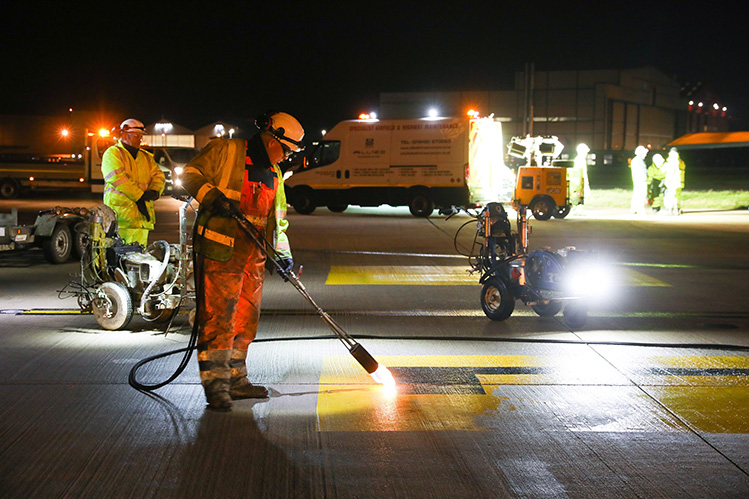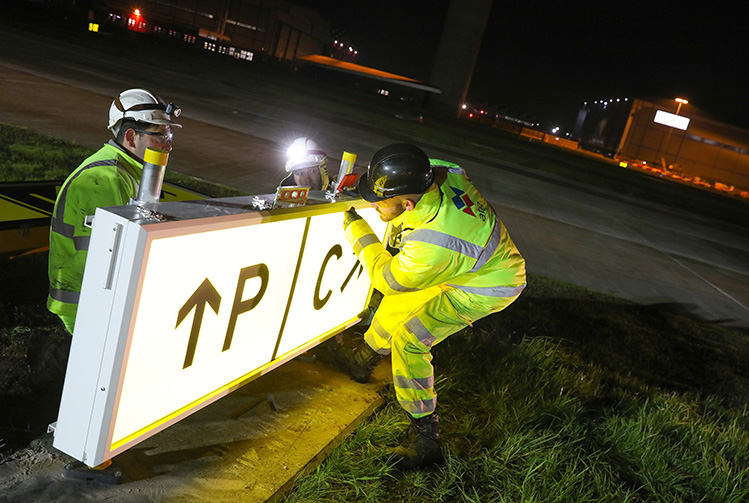Manchester Airport is currently undertaking a £1 billion (€1.2bn) transformation programme that will see an expanded Terminal Two become the focal point of its operations once the works are complete.
To support the shift in its operations, the airport is currently building a dual taxiway system to improve access from its runways to the terminal. The new taxiways will allow two Code E aircraft to pass each other, which will improve the efficiency of the operation.

Manchester Airport is currently building a dual taxiway system to improve access from its runways to the terminal. The new taxiways will allow two Code E aircraft to pass each other, which will improve the efficiency of the operation.
To prepare for introduction of the new parallel taxiways in 2020, changes have been made to a number of the airfield designators. A team of around 30 from the airport, principal contractor Allied Infrastructure, and sub-contractor ATG Airports, worked through the night to install 50 new signs on five sections of taxiway, one runway holding position, and 11 intermediate hold positions.
Additionally, several painted ground markings were altered, and changes were made to the airfield lighting and other control software systems, aeronautical and operational charts, publications and databases.
As more facilities come online and further changes are made to the airfield, the new designators will make it easier for pilots and airside drivers to navigate around the airfield. The airport worked in consultation with NATS and the Manchester-based pilot community to develop the strategy for long-term airfield designators.
These changes are the first phase of re-designation. Further stages will take place as the outer taxiway network is developed between 2020 and 2024.
€130m airfield optimisation
Manchester Airport is spending around £110 million (€130m) on optimising its airfield. Work-to-date has included the creation of 11 new contact stands and three remote stands on Pier One of Terminal Two that opened in April 2019. In addition to these works, Manchester Airport is investing in the latest technology such as Airport Collaborative Decision Making (A-CDM) and advanced ground radar systems. Collectively, these investments will drive operational efficiency by reducing congestion and delays.

To prepare for introduction of the new parallel taxiways, changes have been made to a number of the airfield designators. 50 new signs have been installed on five sections of taxiway, one runway holding position, and 11 intermediate hold positions.
Next year will see the completion of the airfield’s western apron with 10 new remote aircraft stands and doubling the width of taxiway Zulu, which will become a ‘multi-choice’ taxiway. Using colour coded centrelines, it will enable narrow bodied aircraft to push back onto different sides of the cul-de-sac at the same time and taxi past one another without delay.
A further six remote aircraft stands will be reconfigured and upgraded. The newly-constructed section of taxiway Echo will also open, which will create a triple-parallel taxiway system running towards the runways.
“The re-designation of the taxiways is a major milestone for the works that are continuing out on the airfield,” says Rad Taylor, Operations Director, Manchester Airport. “The changes will really benefit pilots and airfield drivers as more of the programme comes on stream. Lots of progress has been made out on the airfield in terms of new stands and taxiways and with more to come it will help improve the efficiency of the operation as our centre of gravity shifts towards Terminal Two.”
Work on the transformation programme continues apace. The first passenger pier opened in April 2019, with the redeveloped terminal building set to open in summer 2020.







